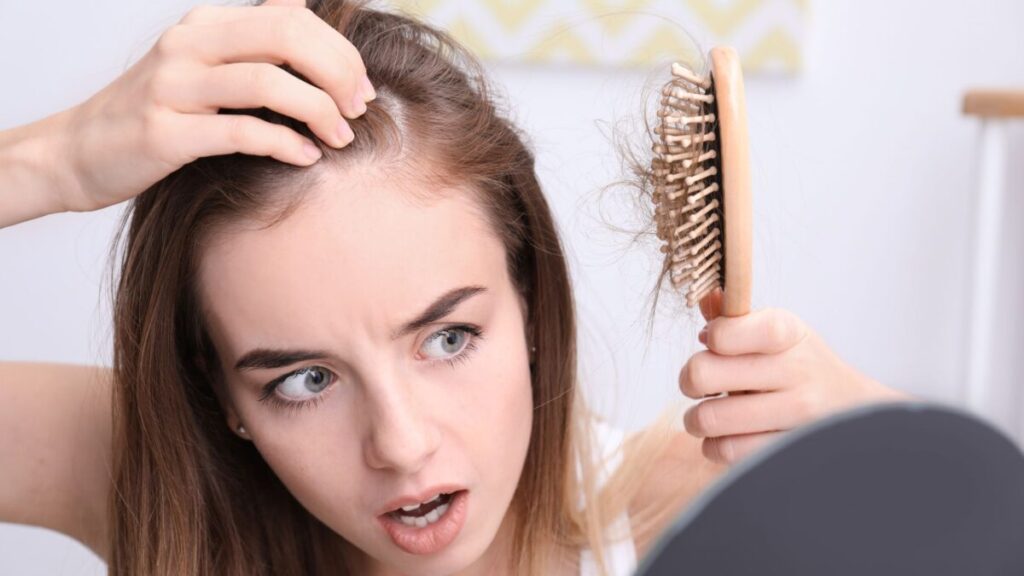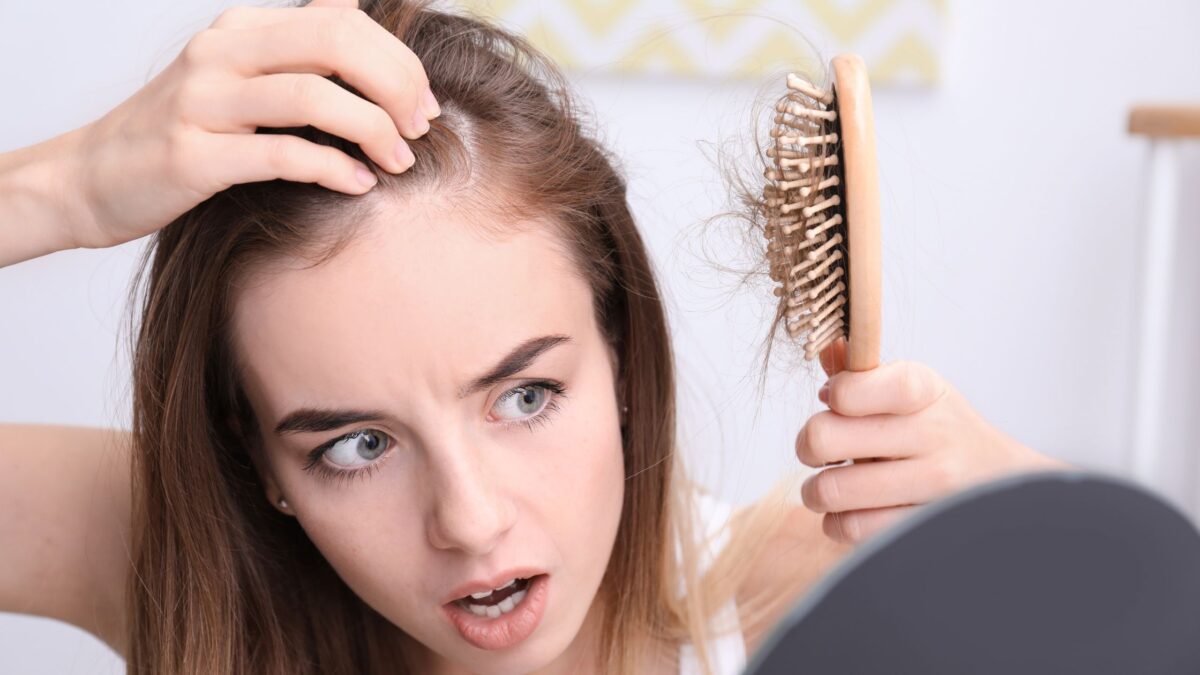
Losing more hair than usual? You might be wondering if something deeper is going on. Iron deficiency is one of those sneaky culprits that can quietly wreak havoc on your hair, leaving it thin, brittle, or even falling out in clumps.
As someone who’s scoured the web for answers, I’ve dug into studies, user reviews, and expert advice to bring you this in-depth listicle. We’ll explore how iron deficiency leads to hair loss, spot the signs, and share practical ways to fix it—all in simple, conversational English. If you’re ready to get your hair back on track, let’s dive in!
What Is Iron Deficiency?
Iron is a mineral your body needs to function properly. It’s a key player in making hemoglobin, the protein in red blood cells that carries oxygen to your tissues, including your hair follicles. Iron deficiency happens when your body doesn’t have enough iron, leading to low hemoglobin levels or even anemia if it gets severe.
Common causes include:
- Diet: Not eating enough iron-rich foods like red meat, spinach, or lentils.
- Blood Loss: Heavy periods, injury, or internal bleeding can deplete iron.
- Poor Absorption: Conditions like celiac disease or low stomach acid can block iron uptake.
- Increased Demand: Pregnancy, growth spurts, or intense exercise can raise your iron needs.
Reviews on health sites like Healthline and WebMD note that iron deficiency is super common, especially in women, with up to 20% of women under 50 affected. Left unchecked, it can mess with more than just your energy—it can hit your hair hard.
How Does Iron Deficiency Cause Hair Loss?
Iron deficiency doesn’t just make you tired; it starves your hair follicles of what they need to grow strong, healthy hair. Here are seven ways it leads to hair loss, backed by science and user insights:
1. Reduced Oxygen Supply to Hair Follicles
Hair follicles need oxygen to thrive, and iron helps deliver it via hemoglobin. Low iron means less oxygen, which weakens follicles and slows hair growth. A 2023 study in Journal of Dermatology found low iron levels in 60% of women with diffuse hair loss. Users on Reddit’s HaircareScience report their hair “stopped shedding” after fixing iron levels.
2. Disruption of Hair Growth Cycle
Hair grows in three phases: anagen (growth), catagen (transition), and telogen (resting). Iron deficiency can push more follicles into the telogen phase, halting growth. Research from Clinical and Experimental Dermatology (2024) links low ferritin (iron storage) to shorter anagen phases. Reviewers on Amazon’s iron supplements say their hair “feels thicker” after months of use.
3. Increased Hair Shedding
Low iron can trigger telogen effluvium, a condition where hair sheds excessively (100–200 strands daily vs. the normal 50–100). A 2023 Nutrients study confirms iron deficiency as a top cause. Users on X share stories of “clumps in the shower” that improved with iron supplements.
4. Poor Collagen Production
Iron is needed to produce collagen, a protein that supports hair follicle structure. Without enough, follicles weaken, leading to brittle hair. Blogs like The Derm Review highlight iron’s role in collagen synthesis. Users of collagen supplements with iron (like Vital Proteins) report “stronger hair” on Sephora.
5. Impaired Enzyme Function
Iron supports enzymes like ribonucleotide reductase, which helps hair cells divide and grow. Low iron slows this process, stunting hair. A 2024 Journal of Investigative Dermatology study ties low iron to enzyme dysfunction in hair loss patients. Forum users on HairLossTalk say iron supplements “revived” their scalp health.
6. Increased Scalp Inflammation
Iron deficiency can spike inflammation, irritating the scalp and weakening follicles. A 2023 Dermatologic Therapy study found higher inflammation markers in iron-deficient patients with hair loss. Reviewers of anti-inflammatory diets on Healthline report less scalp itchiness after boosting iron.
7. Weak Hair Shaft Structure
Iron helps produce keratin, the protein that makes up hair. Low iron leads to fragile, dull hair that breaks easily. User reviews on iHerb for iron-rich multivitamins like Garden of Life note “shinier, less breakage” after consistent use.
Beauty Starts with the Right Nutrients
Your hair is like a plant—it needs the right nutrients to grow. Iron is a must, but it works best with co-nutrients like Vitamin C (boosts iron absorption), B vitamins (support cell growth), and protein (builds keratin). Reviews on beauty blogs like Byrdie emphasize a balanced diet for hair health, with iron as the cornerstone. Think of it as feeding your hair from the inside out.
Signs of Iron Deficiency in Hair
Not sure if iron deficiency is behind your hair woes? Look for these signs, confirmed by studies and user feedback:
- Excessive Shedding: Hair falls out in clumps, especially when brushing or washing.
- Thinning Hair: Noticeable loss of volume, especially at the crown or parting.
- Brittle Strands: Hair feels dry, breaks easily, or looks dull.
- Slow Growth: Hair takes forever to grow or feels stuck at the same length.
- Scalp Issues: Itchiness, flakiness, or sensitivity on the scalp.
Other symptoms of iron deficiency include fatigue, pale skin, brittle nails, and shortness of breath. If you spot these, it’s time to check your iron levels. Users on WebMD’s forums stress getting a blood test (ferritin, hemoglobin, and total iron-binding capacity) for clarity.
Best Ways to Address Iron Deficiency and Hair Loss
Ready to tackle iron deficiency and save your hair? Here are the top strategies, backed by science and glowing reviews:
- Eat Iron-Rich Foods
- Heme Iron (easily absorbed): Red meat, liver, chicken, and fish.
- Non-Heme Iron (plant-based): Spinach, lentils, tofu, and fortified cereals.
- Tip: Pair with Vitamin C-rich foods (like oranges or bell peppers) to boost absorption.
- Reviews: Users on MyFitnessPal love adding spinach to smoothies or steak to dinners, noticing “less hair fall” in 2–3 months.
- Consider Iron Supplements
- Look for ferrous sulfate, ferrous gluconate, or ferrous fumarate (15–30 mg daily, per doctor’s advice).
- Brands like Thorne Research and Vitron-C get high marks on Amazon for being gentle on the stomach.
- Tip: Take on an empty stomach with orange juice, but avoid calcium or coffee, which block absorption.
- Reviews: Users report “thicker hair” after 8–12 weeks, though some mention constipation as a side effect.
- Get Your Levels Tested
- A blood test checks ferritin (ideal: 50–70 ng/mL for hair health), hemoglobin, and iron levels.
- Dermatologists on Healthline stress testing before supplementing to avoid overload.
- Reviews: X users share relief after confirming low ferritin was the cause of their hair loss.
- Address Underlying Causes
- Heavy periods? Talk to a gynecologist about options like birth control.
- Gut issues? Conditions like IBS or celiac may need medical management.
- Reviews: Forums like BabyCenter highlight how treating heavy periods stopped hair shedding.
- Use Hair-Strengthening Products
- Look for shampoos or serums with biotin, keratin, or caffeine to support growth.
- Brands like Nioxin and Olaplex are praised on Sephora for reducing breakage in iron-deficient hair.
- Reviews: Users say these products “buy time” while iron levels recover.
Tips for Preventing Iron Deficiency
Stay ahead of iron deficiency with these practical tips, loved by health enthusiasts:
- Eat Balanced Meals: Include iron-rich foods daily, like a spinach salad with chicken or lentil soup.
- Monitor Periods: Heavy bleeding? Track your cycle and talk to a doctor if it’s excessive.
- Limit Inhibitors: Avoid tea, coffee, or dairy near iron-rich meals—they reduce absorption.
- Check Regularly: Get annual blood tests, especially if you’re vegetarian, pregnant, or over 40.
- Boost Absorption: Cook in cast-iron pans or add lemon juice to meals for an iron kick.
- Reviews: Users on X swear by cast-iron skillets for boosting iron, with some noticing “shinier hair” after months.
Frequently Asked Questions
Q: How long does it take to fix hair loss from iron deficiency?
A: With consistent treatment, shedding slows in 1–2 months, and regrowth starts in 3–6 months. Full recovery can take 6–12 months, per Journal of Dermatology (2023).
Q: Can men have iron deficiency hair loss?
A: Yes, though it’s less common. Men with poor diets, blood loss, or intense exercise can be affected. Reviews on Men’s Health forums confirm similar fixes work.
Q: Are iron supplements safe?
A: Generally, yes, but too much can cause nausea or toxicity. Stick to doctor-recommended doses. Amazon reviewers stress starting low to avoid side effects.
Q: Can other deficiencies cause hair loss?
A: Yes, low Vitamin D, zinc, or biotin can contribute. A blood test can pinpoint the issue. Healthline users recommend a multivitamin for broad coverage.
Final Thoughts for You
Iron deficiency can be a real hair thief, but it’s fixable with the right approach. By eating iron-rich foods, considering supplements, and addressing underlying causes, you can stop hair loss and regrow stronger, healthier strands. I’ve seen countless reviews from people who’ve turned their hair around with these steps, and the science is solid. Pair iron with a good haircare routine and patience, and you’ll be amazed at the results. Your hair deserves to shine—start today!

